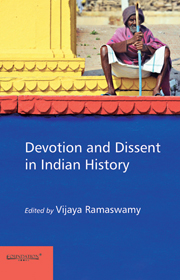Book contents
- Frontmatter
- Dedication
- Contents
- List of Tables and Figures
- Foreword
- Preface
- Introduction: Locating Devotion in Dissent and Dissent in Devotion A Thematic Overview
- Introduction
- 1 Parsing of Devotion and Dissent
- 2 Dissent and Protest in Early Indian Buddhism with Special Reference to Devadatta
- 3 Devotion and Dissent in Hunter's Bhakti
- 4 Devotion and Dissent
- 5 Dissent Within
- 6 Women in Love
- 7 Dissenting Voices
- 8 Dissent in Kabir and the Kabir Panth
- 9 Devotion and Dissent of Punjabi Dalit Sant Poets
- 10 Protest and Counter-protest
- 11 Fakirs of Bengal
- 12 Music in Chishti Sufism
- 13 Dissenting the Dominant
- 14 Devotion and Dissent within the Catholic Church in Late Colonial Bengal
- 15 Narratives of Travel, Voices of Dissent and Attacks on the Colonial Church Fabric of the European Missionaries
- 16 Devotion and Dissent in Narayana Guru
- 17 Sree Narayana Guru's Idioms of the Spiritual and the Worldly
- Contributors
- Index
15 - Narratives of Travel, Voices of Dissent and Attacks on the Colonial Church Fabric of the European Missionaries
from Introduction: Locating Devotion in Dissent and Dissent in Devotion A Thematic Overview
Published online by Cambridge University Press: 05 October 2014
- Frontmatter
- Dedication
- Contents
- List of Tables and Figures
- Foreword
- Preface
- Introduction: Locating Devotion in Dissent and Dissent in Devotion A Thematic Overview
- Introduction
- 1 Parsing of Devotion and Dissent
- 2 Dissent and Protest in Early Indian Buddhism with Special Reference to Devadatta
- 3 Devotion and Dissent in Hunter's Bhakti
- 4 Devotion and Dissent
- 5 Dissent Within
- 6 Women in Love
- 7 Dissenting Voices
- 8 Dissent in Kabir and the Kabir Panth
- 9 Devotion and Dissent of Punjabi Dalit Sant Poets
- 10 Protest and Counter-protest
- 11 Fakirs of Bengal
- 12 Music in Chishti Sufism
- 13 Dissenting the Dominant
- 14 Devotion and Dissent within the Catholic Church in Late Colonial Bengal
- 15 Narratives of Travel, Voices of Dissent and Attacks on the Colonial Church Fabric of the European Missionaries
- 16 Devotion and Dissent in Narayana Guru
- 17 Sree Narayana Guru's Idioms of the Spiritual and the Worldly
- Contributors
- Index
Summary
Varthamanapusthakam, which was written in the 1790s by Father (Fr) Thomas Paremakkal as an account of his travel along with his friend Mar Joseph Kariyattil to Madras, Africa, Brazil, Portugal and Rome and often hailed as the first travelogue in an Indian language, has been used as a literary medium by the author to ventilate his dissent and anger against the hegemonic attitude and the colonial fabric which the European religious missionaries set up for the church in India, particularly for the St Thomas Christians of Kerala. Arguing vehemently that India should be ruled by Indians and not by foreigners, he demands, as early as 1785, that Indian Christians should be ruled not by European religious missionaries but by Indians. Within the larger format of a travelogue detailing meticulously the socio-economic and political processes of the several countries he visited in Africa, South America and Europe, he argues his case by showing how the foreign missionaries, fearing reduction of the span of their power and authority, did not want to have another bishop for the St Thomas Christians and how the innocent priests of this community were brutally killed (as in the case of Chacko Kathanar of Edappilly, who was starved to death in their jails) and the very community often fined for the blunders and crimes of omissions and negligence of these foreign missionaries.
Fr Thomas Paremakkal and Fr Joseph Kariyattil made their travels to Portugal and Rome based on the decision of the general body of the St Thomas Christians taken at Angamaly, for the purpose of informing the Pope and the queen of Portugal of the various discriminations, sufferings and difficulties that this community experienced over a considerable period of time from the foreign Carmelite missionaries working in Kerala. As the general meeting of the representatives of this community at Angamaly was dominated by feelings of anger and animosity against the European religious missionaries and the European bishop working in Kerala, the travelogue has anti-Europeanism as its basic thread, critiquing the hegemonic and colonial fabric of the church set up by the European missionaries. Stressing the need for going back to the pre-Portuguese days when democratic institutions of yogams (representative body at the grassroots levels), mahayogams (representative bodies at higher levels) with jathikkukarthaviyan (head of the community) existed among this community for their administration, instead of one-man centred or European notion of bishop-centred administration, the travelogue challenges the notion of authority that the European missionaries had set up within the colonial fabric they had created for the Church of the St Thomas Christians.
- Type
- Chapter
- Information
- Devotion and Dissent in Indian History , pp. 330 - 347Publisher: Foundation BooksPrint publication year: 2014



